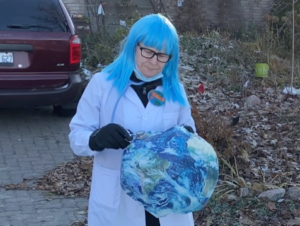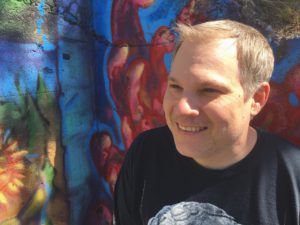Elaine Blacklock
Things changed for Elaine Blacklock when she turned 60. “I gave myself permission to be a great deal weirder,” she says thoughtfully, “more outspoken. To basically stop caring what other people think for the most part. So, it was kind of transformative…”
As a result of that transformation Blacklock, a pediatrician who is “winding down her practice,” now devotes most of her time to environmental activism, with a focus on the intersection of healthcare and the environment. As she prepares to graduate from King’s Master of Fine Arts in Creative Nonfiction in May, she explains that she’s writing a book about these issues.
“I decided to write a book from the perspective of a pediatrician mom, to try to wake up health professionals, to wake up parents, grandparents—anybody who cares about kids—to the fact that climate change is not just an issue for polar bears, it’s an issue for humans. And it’s already having major impacts on our mental and physical health … and it’s only going to get worse.”
She says the book is “part of a much bigger project.” Blacklock also writes a weekly column about climate change for her local paper in Sudbury, Ontario.
 “I have a lot of different ways in which I’m trying to get out the message that we need to be a lot more activist about these issues than we are,” she says.
“I have a lot of different ways in which I’m trying to get out the message that we need to be a lot more activist about these issues than we are,” she says.
Blacklock took up writing after her husband died in 2013. She enrolled in creative writing courses through the University of Toronto, then took a Master of Arts in Science Writing at Johns Hopkins University. From there, she went directly into King’s MFA in Creative Nonfiction.
“I think what I was actually looking for was help writing a book and the King’s program seemed to be just the thing for that, with its mentorship aspect.”
One way that Blacklock has become more outspoken is through the creation of her alter ego, Doctor AIR Care. She describes Doctor AIR Care as a “radical” manifestation of her “environmental conscience.”
“She’s always dressed in black with a white lab coat and a sky-blue stethoscope and her blue hair and black glasses… The great thing about her is that she can say things bluntly that I might hesitate to say so bluntly… And that comes in handy sometimes.”
Though she’s not yet sure how, Blacklock says Doctor AIR Care will be part of her book.
“Part of what I’ve worked on with my mentors has been how to structure the book and how to create, with a really serious topic, space for fun and humour and wit.”
Blacklock is unable to attend Encaenia because she’s been asked to give a presentation that day on climate change and health to the Northern Ontario School of Medicine. But with a little luck she’ll be travelling the country before long. Pending the book’s publication, she plans to promote its release with a cross-Canada tour by electric bike.
“Doctor AIR Care may just be on that bike sometimes and I will stop and give talks at all the hospitals, at pediatric clinics, right around the country.”
Bonny Reichert
“It‘s a memoir about my identity as a child of a Holocaust survivor and how that has affected and enriched my relationship with food,” says Bonny Reichert, describing the premise of her book. Being the child of a Holocaust survivor, Reichert says, “was always a very important part” of her identity.
“I grew up in a house where it was not a secret, it was something that we did talk about… but it’s very complex … how the trauma sort of works its way through the different generations.”
Reichert began her career as a journalist and, while working at Chatelaine, met Kim Pittaway, now the executive director of the MFA in Creative Nonfiction program at King’s. At the age of 40, Reichert left Chatelaine, trained as a chef and began to work as a food writer. Ten years later, she ran into Pittaway at a wedding and learned about the program.
“We started talking and the idea kind of took root from there.”
Reichert’s 91-year-old father nearly starved to death several times during the Holocaust, and her book, tentatively titled How to Share an Egg, weaves together this incredible food story with Reichert’s own, which includes a childhood steeped in the restaurant business, stints as a chef and a career as a food journalist.

“There is something complex and fascinating in this relationship with food. My family’s relationship with food, our restaurants, my dad and his attitude towards food—and of course, my own, pursuing that in my career. At times it’s very heavy, but it can also be playful.”
Though she’s been a writer her whole life, Reichert says that working on her book is completely different. “The book … and the literary tools I’m using to create it—it’s quite new for me.”
At the start of the program, Reichert didn’t know what the book would be. “I thought that I couldn’t write a book that was all about myself. Really uncomfortable with that. So, I had all these complicated ways of getting around [it.]
“It just makes me laugh because my book is something that has always been there and I really didn’t want to face, but I knew I had to face. And that’s the book that I’m working on.”
MFA students attend residencies twice a year in each of the two years of the program. In her second residency, held online with agents and editors in New York, Reichert was paired with an agent who asked her to share her finished proposal when it was ready. Fast forward to today and, with the manuscript still in development, Reichert has already signed a contract with that agent and the rights to her book have been sold in both the United States and Canada.
“It’s a lonely business being a writer and to have someone who’s in your corner is just amazing,” she reflects, adding “I haven’t really gotten into it with my editors yet but they believe in the project and they love it, and I’m very grateful. Truthfully, I’m still pinching myself!”
Jason Schreurs
As a journalist with thirty years of experience, Jason Schreurs spent his entire adult life as a writer. Schreurs recalls his decision to apply to King’s MFA in Creative Nonfiction saying, “I was always pulled towards the creative side of writing, but because I was a journalist I was bound by certain parameters. I always did music writing because music was a huge part of my life and it was more creative, so I did that off the side of my desk as my creative process.
“When I heard about the King’s program and that it was creative nonfiction, I thought, ‘That’s exactly what I’ve been wanting to do,’ but I had never had the chance to actually do it.”
The chance came in the wake of a crisis.
 “I had a major mental health crisis in 2018, so I basically couldn’t do [journalism] anymore. I just couldn’t really do much of anything for quite a while.”
“I had a major mental health crisis in 2018, so I basically couldn’t do [journalism] anymore. I just couldn’t really do much of anything for quite a while.”
When he began to recover, he chose a different path back into writing, though he wasn’t sure if he was ready. He calls applying to the MFA “a leap of faith.”
Schreurs says he knew he wanted to write a book “almost subconsciously.” As he prepares to graduate, he now has a finished manuscript.
“My book is called Scream Therapy and it’s a punk journey through mental health…. The punk rock scene and mental health have always been connected, a place for folks to have a refuge and belonging with their community….
“The main part of the book is … what they call a ‘memoir plus.’ … I tell my own story and the stories of other people in the punk scene who advocate for mental health and use the music and its scene as a form of therapy.”
The punk scene has long been part of Schreurs’ life, though he didn’t start playing music until his 30s. “I’ve been very involved since I was a kid but not in the way that people might imagine. I was … putting on shows, selling records at shows.
“Growing up, I thought, ‘This is the place that I want to be—the people around me understand me…’ it wasn’t that we were trying to be rebellious troublemakers, we were trying to say what we wanted to say about the world and politics and social justice issues.”
Schreurs also hosts a podcast called Scream Therapy. While the book is driven by his story, on the podcast he hosts guests from the punk community who discuss their own stories around mental health. Schreurs hopes fans of the podcast will read the book once it’s published and vice versa.
Asked what one thing will stick with him the most from the MFA, he pauses.
“I think the biggest thing that I learned was patience. I am a person that’s very impatient and I wanna get it done-done-done today … I’d never held on to a project for more than two weeks. And all of a sudden I have to hold on to one for two years or more.”

